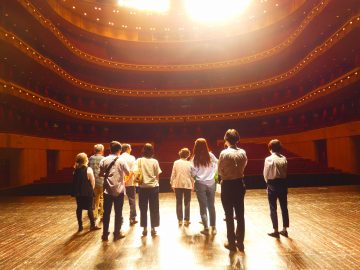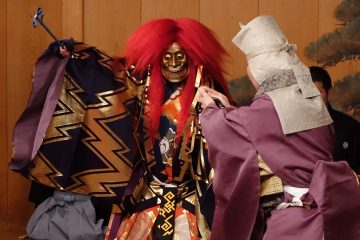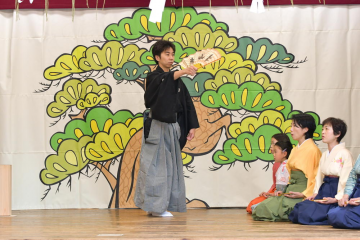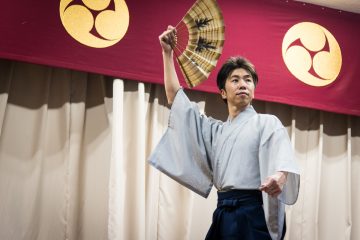Interview with Shiraku Tatekawa | A place where you can confirm your own growth
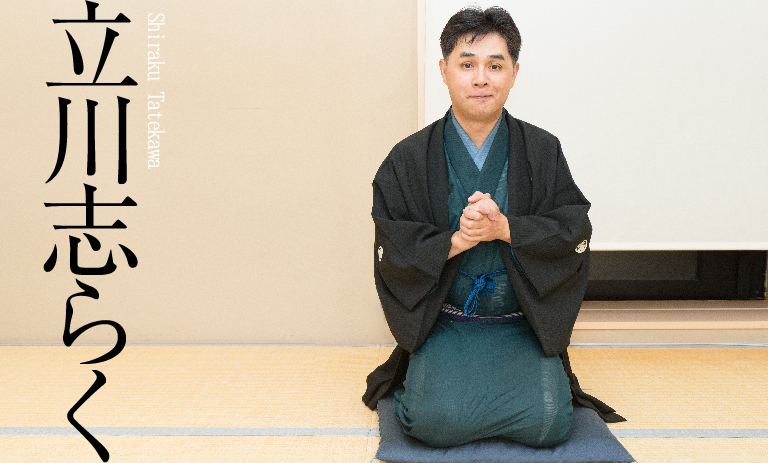
Interview & Text: Masamasa Nishino Photo (Portrait): Eri Nishiyama
A popular project at Yokohama Nigiwaza, "Shiraku 100 Stakes Continued" by Tatekawa Shiraku has finally achieved 100 seats. Since each performance consists of three acts, it took five years to achieve 100 seats. However, as some may have noticed from the title, this is only the second time the show has reached 100 seats. If you include the first and second performances, Master Shiraku has been performing solo shows at Nigiwaza for 10 years. What is the difference between this series, which has been held in the same place for so long, and a normal solo show? What will happen to this series after "Shiraku 100 Stakes Continued" is over? We were able to ask such simple questions in the dressing room just before the final performance of the "sequel series" that achieved 100 seats.
--Today marks the end of "The Continuation of Shiraku Hyakuseki" having reached 100 seats, but what was the motivation behind starting "Shiraku Hyakuseki," the predecessor to this series?
Tatekawa Shiraku (hereafter, Shiraku): Since Nigiwaza opened, I have been holding group meetings and solo performances. However, since the group meetings were held in the format where my students would come out and I would do one act at the end, not many customers came. In the past, I used to invite various guests to my solo performances at Nigiwaza, such as singer Yoshie Kashiwabara and film director Nobuhiko Obayashi, but I received many requests to hear more of Shiraku's rakugo. So I thought, "Well, let's settle down and do a complete solo performance," and planned "Shiraku Hyakuseki." This title comes from the fact that in the past, San'yutei Ensho, a master of the Showa era, had recorded 100 rakugo stories he had selected in a studio in order to leave them for posterity, and sold them. So I thought, "Well, I'll try doing that live," and I announced all of the stories he was going to perform. Then, the number of customers steadily increased, and thanks to that, advance tickets are now consistently sold out.
After the first "Shiraku 100 Stakes" ended, why did you decide to continue with another 100 shows as "The 2nd Shiraku 100 Stakes"?
Shiraku : It takes almost five years to do 100 performances, but when I started, it was over in the blink of an eye. I could have ended it there since I had done 100 performances, but Nigiwaiza asked me to continue, and I thought that if I started again with the exact same content, I could better understand how my rakugo has grown, so I started the current "Continuation of Shiraku 100 Performances." Some things may have grown and some may have regressed, and I may receive criticism as well as laughs. I wanted to try it again, including all of that.
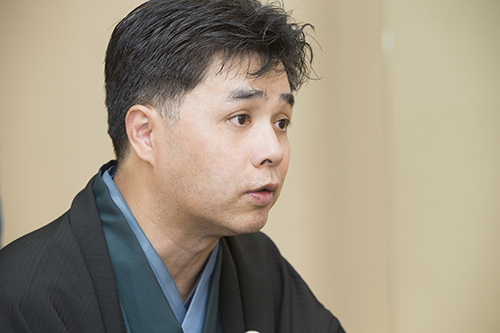
A hundred performances is quite a large volume as the name suggests, but are there any criteria for selecting the pieces or for the overall composition?
Shiraku : There are only about 300 jokes performed in rakugo. When I started performing 100 jokes, I had about 150 jokes, and now I have just under 200. From those, I select jokes that I perform often, occasionally, and rarely, and since one rakugo performance is about three stories and lasts about two hours, I select "short stories," "medium stories," and "long stories" from those three to make up the whole performance.
--I've heard that you are also starting to come up with ideas for the next new series.
Shiraku : It hasn't been announced yet, but the next one after "Sequel" will probably be "New Shiraku 100 Stakes" (laughs). In the 10 years that we've been doing the 100 Stakes series, there are new jokes that were prepared for this series, and jokes that we never normally do but have started doing quite a lot through the series. So, for this new series, we're going to do a total overhaul, discarding the ones that didn't feel very good in the previous 100 Stakes, and not only adding new jokes, but also rearranging the order of the jokes that we're going to perform again, and trying to organize them.
You have been attempting this unprecedented undertaking of presenting 100 performances of the same piece at the same venue for 10 years now. Is there anything that you have noticed as a teacher through this endeavor?
Shiraku : I think the biggest thing is that I was able to concretely understand my own growth, which had been vague until now. Comedians remember the things that didn't go well more than the things that did. If you try something once and it doesn't work, but the second time you feel a completely different response, you clearly realize that "I've grown that much." When you perform here and there, you get a decent response everywhere, and when you try a joke that was well-received elsewhere, it doesn't go over so well. Sometimes, being complacent because it's a surefire hit everywhere can stop you from growing, and this series has been established as a way to confirm that, or to objectively observe your own growth.
--You've said that there have been times when material that was well received elsewhere didn't go over well here, so does the atmosphere at Nigiwaiza differ from other venues?
Shiraku : This theater was created by a lover of Rakugo, Mr. Hiroshi Tamaki (former director), so I think it's the easiest space to perform in the Tokyo area. Personally, I don't like people eating and drinking during a performance in a brightly lit auditorium, but in this venue, it doesn't bother me at all. Most customers who don't know much about Rakugo eat and drink as if they were watching TV at home, which makes it difficult for us to do our job and is a nuisance to the other customers. But the customers who come here all come because they like it, so they eat and drink with that in mind. They don't get drunk when they drink, and they drink just enough to enjoy the Rakugo (laughs).
--So Rakugo is still the main focus (laughs).
Shiraku : That's right. The audience knows that much. Even though it's such an easy place to perform, there are times when the reaction is bad, and as I said before, it's a place where you can really see your own growth.
--By the way, we talked about the new series earlier, but do you have any plans for how long you want to continue this "Hundred Seats Series" in the future?
Shiraku : If Nigiwaiza would let me do it... the new series will end in five years, but the next time I do it I'll be 60 years old. So I think the next one will be the "60th Birthday Series." And in five years, I'll be in my mid-60s, so it will be the "Mature Series," and the next one will be 70, so it will be the "final series" (laughs). If I'm still in good health after that, I'll do the "Testament Series" in my mid-70s, and if I'm still in good health at 80, I think it will become the "I'm Still Alive! Series," so if I want to continue, it's possible.
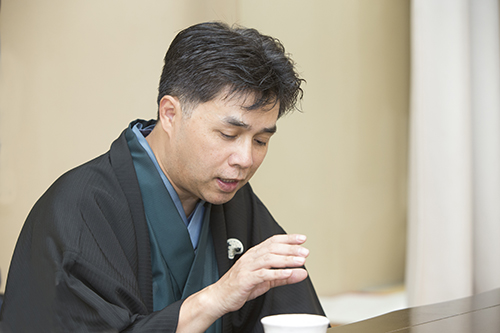
--The content will continue to mature, so this is definitely a series I'd like to see continue (laughs).
Shiraku : When I'm around 70 years old, I think audiences will be able to enjoy the show by saying things like, "I've been watching since the first show," or "It's completely different now than it was back then." In that sense, I think I can create something that's more enjoyable for audiences than a regular solo performance.
--Finally, could you give a message not only to Rakugo fans, but also to those who have never seen Rakugo before and those who are currently interested in it?
Shiraku : If you love rakugo and go to see it regularly, you don't have to go to all 100 performances. If you go to all of them, you might get bored and stop coming, so please choose something that makes you think, "I want to go to this one" (laughs). And for those who have never seen rakugo before, solo performances can be hit or miss. If you miss something, you might think, "I'm not going to see this person's performances anymore," but in the case of the "100 Performances Series," it is well-balanced and divided into three parts, so there are no "big misses." Rakugo may seem intimidating, but if you just drop in like you would a movie or a play, I think you'll enjoy it even if you don't have much knowledge. As long as you understand Japanese, you'll be fine (laughs).
──Thank you for speaking with us before the show today. I'm looking forward to the next episode of the "New 100 Seats Series"!
After the interview, I had the opportunity to see the last performance of the "Continuation Series". The two themes announced on the day were "Shinigami" and "Nakamura Nakazo". "Shinigami" is a piece that you can't take your eyes off of, as it is about the protagonist's haphazard actions, blinded by greed, and his interactions with the Grim Reaper. The last piece, "Nakamura Nakazo", is a piece that details the trial and error and struggles that real-life great actor Nakamura Nakazo went through before he became successful, and it was not only an interesting story, but also an interesting discovery of new knowledge about such a person. Of course, I was ashamed to say that I had no prior knowledge of these pieces, but I was able to understand and enjoy each piece from start to finish. As mentioned in the interview, some people may think that rakugo is a little difficult to get into, but that's not true. Rakugo can be enjoyed by people of all ages, and as long as you understand Japanese, you'll be fine! I hope you'll take a trip to the world of rakugo.
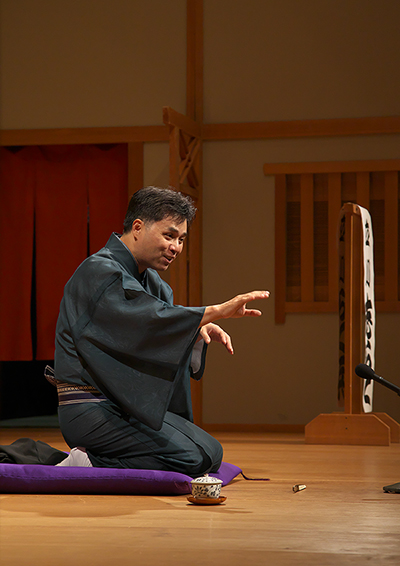
2015.9.15 From the 100 Shiraku Performances Continued: "Shinigami" | Photo: Masako Yamada
[Tatekawa Shiraku appearance information!]
●Shiraku's 30th Anniversary Commemoration Part 4 "Tachikawa Shiraku Solo Performance with ZAZEN BOYS"
10/30 (Fri) 19:00~ Yurakucho International Forum C
● "This year's last Tatekawa Shiraku solo performance"
December 23rd (Wednesday, National Holiday) 13:30~ Yurakucho Yomiuri Hall
